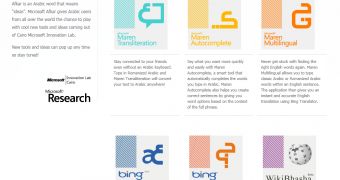Microsoft Afkar is an online destination for users in the Middle East, and not only, to find a range of projects designed to streamline their use of Arabic. Some Softpedia readers might remember that over a year ago I told them about the Maren project from the Microsoft Innovation Lab in Cairo (CMIC).
According to Microsoft’s Steve Clayton, Maren has evolved quite a bit in the last year. Customers need only head to Microsoft Afkar in order to access a range of Maren downloads.
“One of the biggest challenges Arabic speakers face is the lack of access to Arabic keyboards - and some people don’t know how to use these keyboards,” Clayton said.
“CMIC created a handful of apps to help bridge that gap and they built a new website – Afkar.microsoft.com, where you can download them for free. Specifically, they’ve developed tools to help create content in multiple languages, to browse the web and to translate.”
In Arabic, Afkar means “ideas”, an introductory note on the website explains, along with stressing that the tools provided are designed to let customers experiment with the projects from the Cairo Microsoft Innovation Lab.
The Arabic alphabet differs dramatically from the Latin one, and English keyboards in use force Arab users to write phonetically in their own tongue.
The Maren downloads come to close the language barrier for Arabic users, and customers should at least give them a try, especially since they’re offered free of charge.
Clayton made sure to highlight the latest Maren tools, as well as provide and explanation about what each one does:
“•Maren Transliteration converts your Romanized Arabic into Arabic.
•Maren Autocomplete provides up to four word options based on the context of the paragraph you’re typing, and completes sentences based on data from Wikipedia, the Quran and the Arabic Bible.
•Maren Multilingual uses Bing Translator to give you an instant, English translation of the classic or Romanized Arabic words you typed.
•Maren Morph automatically analyzes an Arabic word that you’ve typed using English, and gives you the possible choices, along with corresponding diacritical marks.”

 14 DAY TRIAL //
14 DAY TRIAL //